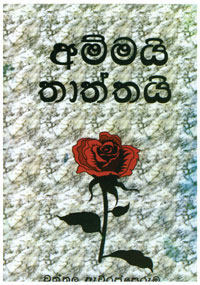|
Focus on Books:
Nostalgic narratives
Professor Sunanda Mahendra
Ammai Tattai (Father and Mother). A short story collection.
Wattala E. Weerapperuma
Published by Provincial Writers Association Wattala
133 pages
 These short stories have been written over a period of three decades
or more and some of them have appeared in various Sinhala newspapers and
periodicals of the calibre of Savasa, Janata, Gnanartha Pradeepaya,
Bhakthi Probhodanaya, and some special Christmas issues and supplements. These short stories have been written over a period of three decades
or more and some of them have appeared in various Sinhala newspapers and
periodicals of the calibre of Savasa, Janata, Gnanartha Pradeepaya,
Bhakthi Probhodanaya, and some special Christmas issues and supplements.
The intention in bringing out this collection seems to be a nostalgic
mood where author Weerapperuma feels that his writings should be
compiled as freely as possible without much of a re-adjustment or
re-evaluation in literary judgment as regards the present day values or,
more specifically, the accepted norms and literary merits. As such, he
has requested a few literary critics to air their views on his creative
abilities.
Some prefer to state the drawbacks openly as well as merits of his
creativity as a shortstory writer. I am happy that Weerapperuma has the
frame of mind to handle such comments and print them in his collection
as extra reading material. While agreeing with some critics' comments, I
feel that there are at least a few stories worth mentioning as
creditable creations.
One such example that comes to mind is the story revolving round the
character of Mary Magdeline and Iscariot, where the reader finds a
religious undertone covering the human experience declaring the mind
sandwitched between the concept of sin and the social values which
create it.
This also shows to what extent a writer could derive inspiration from
religious sources and recreate in modern terms. I feel that the other
story titled Apatat Nattalak (A Christmas for us too), which is yet
another religious narrative too is a creditable creation where the
protagonist understands the aspects of poverty and the riches in a
religious ceremony adhered to by a deeper sense of faith.
The story is slightly reminiscent of Dickens' 'Christmas Carol'. But
I felt that one anticipates a better sense of interpretation rather that
of a sweeping comment on riches and poverty in the context.
I feel that the writer is at his best when it comes to stories of
nostalgia where he finds that in the title story Ammai Tattai. The
protagonist realizes the values of parental intimacies and affection
only when they are no more.
Furthermore, the worthiness of the parental values rest on the way
you look at them recalling to the mind what they have done to you and
evaluating the values in the same process. The parents may have had
casual disputes over trivial day-to-day matters, and they become
irritable for the time being.
But as time flies, they are remembered as lessons from the past. They
too become inseparable entities in the life of the children or the
offspring.
Weerapperuma is fond of narrating stories as they happened in the
form of events and this presumably covers his ability to create more
sensitively the characters and their inner conflicts.
This is seen as a driving force in his creations overshadowing the
creative thinking. In this manner some of the significant events are
recollected as mere events and not as creative narratives of any
aesthetic significance.
Take for example the story titled Anukampava (Sympathy) (93pp) where
a father is driven to meet a physician to cure the serious state of a
child. But nobody seems to take him seriously and moneywise the father
is in dire need where the moneyed people do not sympathise with him.
But as he fails on his way he realises his plight as a human being
with a grave sense of self pity. This narrative would have been
developed further giving vent to the subtlety of human nature.
More or less the same experience is recounted in the story titled
Ataramaga (On the way) where the reader finds a trouble-minded son in
search of a doctor, as his father is not well and laid on the bed. But
he finds it difficult to find a doctor as he encounters various other
barriers on the way.
He is mentally disturbed and he too realises the vanity of this life.
Such barriers have fallen as impediments in the social structure. But my
point is that although the vision is there as a humane writer, the
absence of the complex creativity does not allow the writer to grasp the
same via the narrative.
Weerapperuma is basically a good observer of human events, on such
aspects as family patterns, parental love and intimacies, the meeting
and departure of lovers, the social injustices etc.
I am sure if more time is devoted to his creative thinking, he ought
to prove a better creative writer. Weerapperuma attempts to use
attractive narrative techniques of expression such as the use of the
inner feelings of individuals, the use of letters and confessions on the
part of people entrapped in circumstances etc.
Though gifted to write in Sinhala, I feel that the construction of
certain sentences on the part of expression are disarrayed and comes
closer to reports and mere verbal descriptions failing to make a deeper
impact via creative thinking due to the confusion in the creative
thinking.
I am not sure whether there are any hard and fast rules on creative
writing, where short story becomes one genre. But there is the sense of
sensitivity in the capture of moods and situations which is a paramount
factor. The lack of commitment to the presentation of this factor may be
the drawback in some narratives.
[email protected]
|

